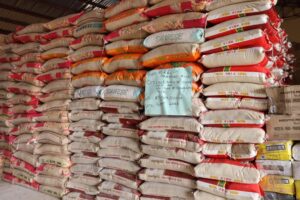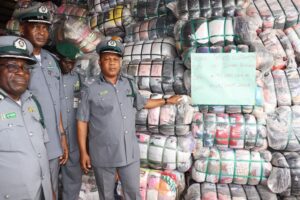There is a cause of every problem. Sometimes, it is difficult to determine or understand the causes of a problem, especially when the problem has become complicated.
Over the years, smuggling has been a big economic menace for Nigeria. Smuggling simply means moving goods out of a country or into a country illegally. It involves taking things or people to or from a place secretly and often illegally. Sometimes, these goods are in a the country’s list of prohibited items.
Ignorance, criminality as major causes of smuggling
From September 10 to 30, 2023, The Economy carried out a survey to determine leading causes of smuggling. The survey was carried out in two South-west Nigeria-Benin border towns,namely Seme and Idiroko to measure the bigger cause of the economic crime among poverty, joblessness, ignorance, bad economic policies and defiance.

Out of a total number of 50 people drawn from the two towns, the result surprisingly showed that ignorance is the larger cause of smuggling, ahead of defiance (criminality) and poverty in that order taking up 48% (24 respondents), 24% (12) and 17% (8) respectively. Respondents who blamed unemployment and poor trade policies were in remote fourth and fifth positions, with 8% (4 respondents) and 3% (2) respectively.
Some respondents helped to understand the issues better by leaving their opinion with details. One of the many respondents who blamed the problem of smuggling on ignorance, Uchenna Moses, a businessman at Seme, said: “At first thought one would blame unemployment and bad trade policies, but a proper understanding would reveal that the traders who are most people involving in smuggling do not understand that smuggling is a crime.”
He continued: “Many of the traders are women who think they are doing a legitimate business and looking at Customs officers as enemies of their lives. Now, this angle is different from perpetual car smuggler who has taken to smuggling as his business, or the drivers who help with movement of smuggled goods, called ‘fire work’ in local parlance.
“You must understand that the nature of our smuggling problem is different from developed countries where smuggling is driven by intended criminality (defiance) because the people over there understand that what they are doing is a crime and they go with sophisticated weapons to beat security.”
The response of a trader at Idiroko, who identified herself simply as Maggie further underpinned Moses’ opinion.
Maggie said: “We are suffering in this country and we just want to do what we can to survive. I am a trader and i make more profit when i buy goods from Benin. How can you tell me that this is a crime.”
Maggie denied knowledge of goods on Nigeria’s prohibition list.
Ignorance breeds hate against Customs officers
Growing hatred against Customs officers
With most women smugglers seeing themselves as harmless traders, Customs officers are usually seen as enemies who do not want them to succeed. Many of the respondents heaved curses and abusive comments on Customs officers for seizing their goods.
“I don’t know why Customs (officers) hate us so much. Sometimes, even when you offer to give them money so that they can let you go with your goods, they refuse. They just want to seize your goods. I hope they have wives and sisters who are also struggling to survive like us,” said Uyi Ofulue, a cross-border who is based in Benin City, but captured by The Economy survey team at Seme.

A stock of seized smuggled parboiled rice
Ofulue is just one of the many traders who hold the erroneous opinion that they are engaging in normal business but being witch-hunted by men of the Nigeria Customs Service. This erroneous belief has led to misplaced hatredness against Customs officers operating at border towns. This has also led to unceasing attacks against Cuatoms officer by locals who are sympathetic to the plight of traders who goods are seized.
Customs officers also face brutal and ceaseless attacks by locals and hardened smugglers who engage in smuggling with intent and in defiance to inherent dangers of smuggling.
The Controller, Nigeria Customs Service (NCS), Ogun Area 1, Mr Ahmadu Shuaibu recently raised the alarm over series of armed attacks against his men at the border towns. According to Shuaibu, these attacks range from blockage of access roads by locals, mob action, and altercation from smugglers and their sympathisers, often resulting in loss of lives.
Speaking at the 5th annual Independence s
Symposium organised by the Ipokia Local Government Youth Forum (IPYF) in conjunction with NCS Ogun Area 1 Command, Shuaibu said many of his officers had lost their lives or suffered permanent disability in such attacks.
The controller, who spoke through his deputy, Charles Ogunesan, said smuggling activities not only retard economic development and social well-being but also endanger national security.

Customs officers inspect the seized contrabands
He said: “These experiences range from blocking of access roads by smugglers and their sympathisers, mob attacks of officers either going in pursuit of information or conveying seized goods to the government warehouses, skirmishes to altercation which often result in casualties.
“We have lost scores of officers to death and permanent disability while our dear communities have also lost many of their members to the evil of this unfortunate demon called smuggling. It is high time we said no to smuggling considering the dangers inherent in it.”
Call for positive action
Many respondents who blamed ignorance for smuggling menace opined that adopting development communication models could help enligten market women about the illegality of smuggling and elicit the desired understanding by perpetrators that can bring about a behavioural change in them.
Some also said such enlightenment efforts should begin with community leaders, who can mobilise their subjects to check smuggling with little input from Customs officers if they have the right understanding.
“You may think that the local are being troublesome, but I think that they are not enlightened enough to understand that why they support smugglers, they are committing a crime. So, I will suggest that deliberate development communication programs could be aired on radio and television or in other channels that can have direct reach to people living in border towns,” said Dapo Adefila, a wharehouse manager at Idiroko.

He continued: “Smuggling as we are seeing it in Nigeria currently is a development problem. The need for food, poverty and unfavourable economic policies are also major causes of food smuggling. Smuggling of food stuff and personal effects are the most here. Government should initiate and continue for a long time, appropriate development communication strategy to reach everyone involved.
“I am concerned about market women who end up losing borrowed money when their goods get seized. I have interacted with many of them and I can tell you for free that many of them don’t understand the intensity of smuggling as a crime.
If they do, many of these women will not risk borrowed money on a smuggljng business that has a higher chance of failure coming seizure of their imported prohibited goods.”
The Ogun Customs Area 1 Controller, Shuaibu seems to share Adedila’s view when he said the command seized goods valued at N1.5 billion in the last nine months, noting that if such amounts were spent on legitimate trade it would have improved the economy of the communities and the nation.
He however reiterated the strong resolve of the Nigeria Customs Service under the current regime to leave no stone unturned in suppressing smuggling.
“Our core mandate in Ogun State is to generate revenue, suppress smuggling and facilitate legitimate trade and secure our border lines. I want you to know that the security and development of our dear nation are the responsibility of us all,” he said.


